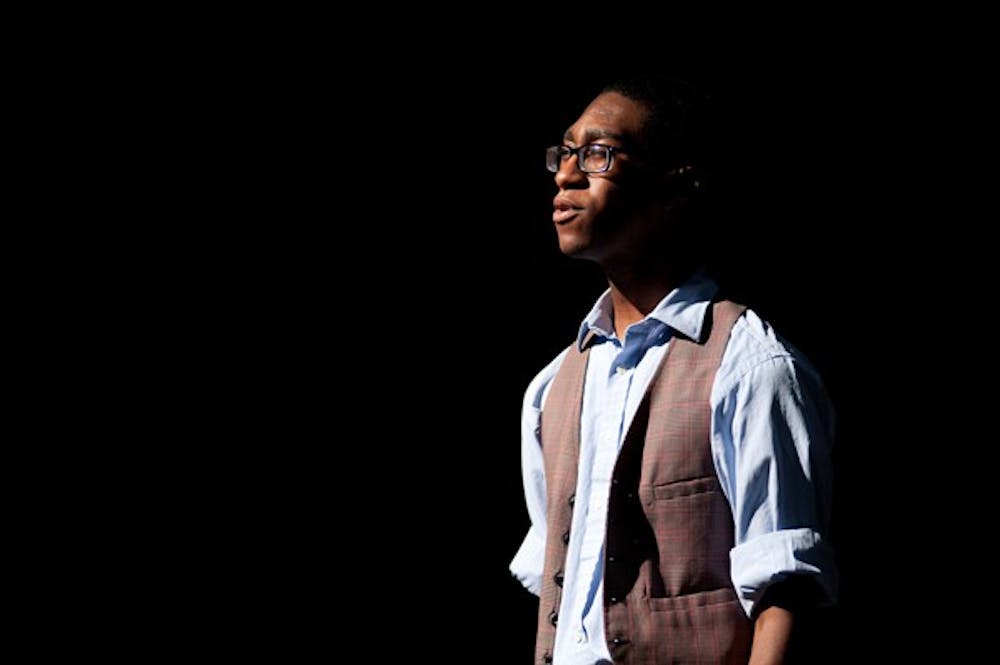The process of creating a theater production generally takes a traditional form: the director chooses a show, peruses the script, casts actors who seem best suited to the characters, builds sets to reflect the stage directions and unveils the show for the audience to interpret.
“Wecycling,” the AU Department of Performing Arts’ latest musical, throws away the rulebook.
“Wecycling” is an original performance that uses everyday objects, music, poetry, monologues and movement to explore life’s inevitable cycles. It’s a devised piece, meaning the play was devised through the actors’ improvisation and storytelling, and written by the director during the rehearsal process, according to cast member and School of International Service freshman Lucette Moran.
AU theater professor Caleen Jennings created the concept behind “Wecycling” when one of her colleagues inspired her with her habit of saving a chair from each production she directed. Jennings began thinking about the idea of recycling and the possibility that “we” cycle as well.
“At 62, I can look back at the cycles I’ve been through,” Jennings said. “What does an 18-year-old’s cycle look like?”
Rather than finding a pre-existing script that explored these themes, though, Jennings sought her actors first. For auditions, each actor was asked to tell an off-the-cuff two-minute story.
“This is just an incredible cast,” she said. “I told them at the beginning, ‘If you like to know everything in advance, don’t do this show.’”

The 14 actors on display did not mind the uncertainty.
To develop the show, Jennings engaged the performers in conversation about their ideas and strengths. During winter break, Jennings required the actors to do a series of stream-of-consciousness writing exercises to hone in on pertinent themes.
“Caleen keeps telling us not to act,” said Ryan Mays, a freshman in the School of Communication. The idea is that the actors will capture the audience’s attention with their own perspectives, not by playing characters, Mays said.
“This is a show about story,” Jennings said. “In storytelling, the story moves through you.”
Jennings also encouraged the actors to utilize their pre-existing talents. The songs, some of which were written before the show was conceived, present opportunities for musical experimentation. In that vein, several of the actors play musical instruments as varied as ukulele, flute and cello.
The actors also draw from their own personal stories to give the script emotional backbone, according to Jennings.
“We play ourselves,” Moran said. The performers individually and collectively tackle themes of confusion, transition, life, death, relationship, technology and religion.
At several points, the actors stop the show to engage in conversation with the audience. This unusual stylistic choice is intended to make the audience feel like an integral part of the experience.
“Hopefully, people will feel that they’ve also put a story in the communal pot,” Jennings said.
Mays admitted that this unconventional process proved more challenging than traditional rehearsals.
On the other hand, the show is not without its fun moments. At one point, Mays plays a cow. At another, the characters bemoan the “awkward, awkward, awkward” consequences of puberty. One actor skewers Lance Armstrong, another extols the virtues of dumpster diving. Serious themes abound, but humor frequently punctuates the drama.
Jennings said that, ultimately, directing “Wecycling” has opened her eyes to people’s generosity.
“People are really incredible,” Jennings said. “Every story is a gift.”
The show forgoes traditional narrative to reach at the audience’s deepest emotions and longings. It’s an unpredictable, digressive and ultimately rewarding experience, as much for the cast and crew as for the audience.
mlieberman@theeagleonline.com





